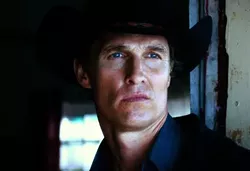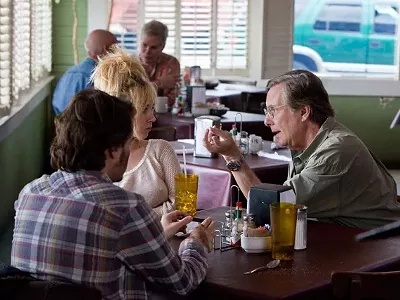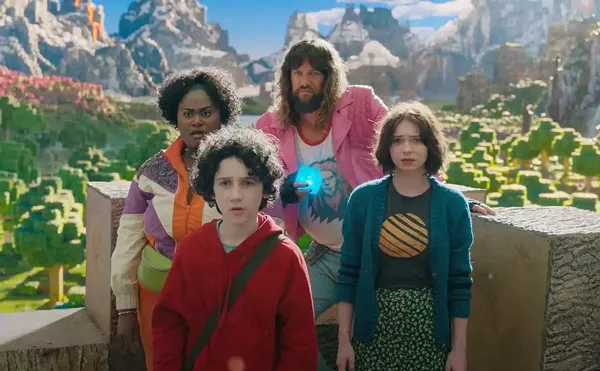
Killer Joe| B+
You'll never look at a Kentucky Fried drumstick the same way again.
If pulp novelist Jim Thompson and overheated playwright Tennessee Williams had a baby, it might look a little like William Friedkin's Killer Joe. A blood-spattered adaptation of Tracy Letts' twisted trailer trash stage play, this is the kind of movie Hollywood is too squeamish to make anymore: reveling in lurid, low-brow sensibilities with a ferociousness and artistry that overcomes any question of taste.
Chris Smith (Emile Hirsch) is a 22-year-old drug dealer. His mother has stolen his stash. Now he has to come up with $6,000 fast or be killed. Recruiting his father, Ansel (Thomas Haden Church), to help him, he decides to have dear old mom killed then collect the $50,000 in insurance that's been left to his sister Dottie (Juno Temple). Everyone, especially Ansel's new wife Sharla (a frequently bottomless Gina Gershon), is on board, but not one of them is a killer. Enter Det. Joe Cooper (Matthew McConaughey), a dirty cop and hired killer with all the manners of a Southern gentleman. Chris promises him a $25,000 payday, but when it turns out that money is contingent on the murder, Joe demands that Dottie be offered up as his retainer. Obviously, things don't quite work out the way they're supposed to.
At 76, Friedkin (The Exorcist, French Connection) directs with all the confidence and inventiveness of a man a third his age, giving every scene menacing verve and seedy energy. His visual approach is slick and stylized, a prismatic noir set in West Texas' geography of nowhere, it is a moral wasteland where anything can happen. In a fantastically frantic foot chase, in which Emile Hirsch is pursued by a pair of biker thugs, Friedkin fills the frame with ravaged, graffiti-covered warehouses. They are monuments to Letts' landscape of hopelessness, a cruel maze where his characters search for an exit that doesn't exist. More interesting is what Friedkin does with sound, punctuating the movie with the rumble of thunder, the angry bark of a neighbor's dog, televisions turned too loud, and the menacing click of a metallic lighter, accents stressing the pain and failure in these characters' lives.
To say that the movie presents an unflinchingly bleak and ugly world would be an understatement. Still, Friedkin pulls off a fascinating trick here. On the one hand, his film is filled with sociopaths, most of whom are dishonest and scheming idiots. Blinded by their own greed and self-interest, they would seem to deserve our scorn and ridicule. And yet, Killer Joe never loses sight of their humanity, however slight it might be. Chris is genuinely loyal to his sister Dottie. Slow-witted Ansel has the sad sense of defeat that comes to a man who understands the extreme nature of his limitations. Even the venal Sharla, a woman who thinks she's a lot smarter than she is, earns a thimbleful of empathy when she's brutally punished by Joe for an act of treachery. Sure, these murderous hicks deserve their comeuppance, but Killer Joe is never contemptuous of them. Instead, it presents a sardonic portrait of an embattled American family embracing a corrupted version of the American Dream.
Of course, it helps that most of Friedkin's cast bravely and boldly bites into this sordid knot of miserable characters. McConaughey continues his recent streak of ambitious roles (The Lincoln Lawyer, Magic Mike) with a tour de force performance that drips with oily charm and deep-fried viciousness. Joe is courtly and controlled, the smartest sociopath in the bunch. Temple, whose Dottie could have stepped out of Williams' Baby Doll, is brilliantly ambiguous as his trailer park nymphet, a wistful love interest who never lets on whether she's vacant or depraved. There is a palpable spark of connection between them, and you can't figure out whether it's lust or loneliness. Both are clearly attuned to the absurdity of their murderous situation, yet happily participate. The rest of Friedkin's actors are first-rate. Only Hirsch struggles to convince, mainly because he seems too smart and self-aware to sell his character's stupidity.
Not everything in Killer Joe holds together. Letts fills the narrative with blind alleys and details that don't amount to anything. But damn if you can take your eyes off the thing. Garish and tense, Friedkin's sordid chamber piece tests the humanity of its characters as they are ensnared by need. And as the story spirals into ever-darker and more violent territory, it plays with us much the way Joe plays with the Smith family. It dares us to witness just how ridiculously brutal this perverted parody can get, then are forces us to answer whether that's what we really wanted to see in the first place.






